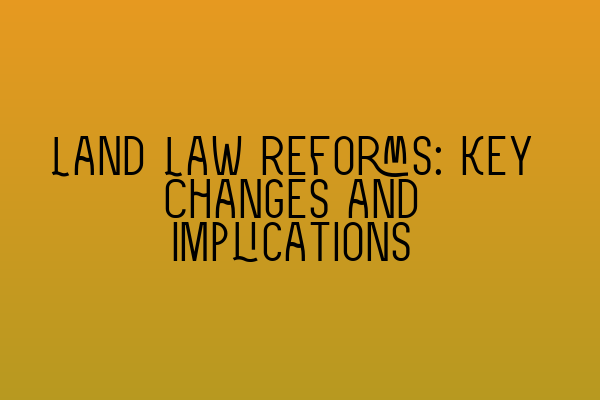Land Law Reforms: Key Changes and Implications
In recent years, land law reforms have brought about significant changes to the legal landscape. These changes have had far-reaching implications for property owners, tenants, and all those involved in property transactions. As a leading solicitor at SQE Property Law & Land Law, I am here to provide you with a comprehensive overview of these key changes and their implications. Whether you are a property owner, a tenant, or a legal professional, understanding these reforms is crucial for navigating the complexities of land law in today’s legal environment.
1. Electronic Conveyancing
One of the most significant changes in land law reforms is the shift towards electronic conveyancing. This modernization initiative aims to streamline and expedite property transactions by digitizing the conveyancing process. Electronic conveyancing allows for faster processing of title deeds, automated searches, and efficient exchange of contracts. This not only saves time and reduces paperwork but also minimizes the risk of errors and fraud. With electronic conveyancing becoming the norm, it is essential for legal professionals to adapt to these changes and embrace digital platforms and technology.
2. Land Registration Reforms
Land registration reforms have also had a profound impact on property ownership and transactions. The introduction of the Land Registration Act has made it compulsory to register all land transactions and interests on the Land Register. This centralization of land records helps provide greater clarity and transparency regarding property ownership and encumbrances. It also simplifies the process of carrying out searches and reduces the risk of undisclosed interests. Engaging with licensed conveyancers or solicitors who are well-versed in the new land registration system is crucial to ensure compliance and avoid any potential pitfalls.
3. Leasehold Reforms
Leasehold reforms have been a hot topic in recent years, aiming to address the unfair practices and lack of transparency in leasehold agreements. The introduction of legislation such as the Leasehold Reform (Ground Rent) Act and the Leasehold Reform (Amendment) Act has brought about significant changes to leasehold property rights. These reforms include restrictions on ground rent increases, the simplification of lease extension procedures, and the introduction of the right to buy the freehold collectively. Understanding these reforms is crucial for both leaseholders looking to assert their rights and landlords ensuring compliance with the new legislation.
4. Tenancy Reforms
Reforms in the area of tenancy law have also had a significant impact on landlords and tenants. The Tenant Fees Act, for example, has placed restrictions on the fees that landlords can charge tenants, ensuring fairer and more transparent rental agreements. The introduction of the Fitness for Human Habitation Act has also reinforced tenants’ rights to decent and safe living conditions. It is essential for both landlords and tenants to be aware of these reforms to ensure compliance with the law and maintain a harmonious landlord-tenant relationship.
5. Environmental Considerations
Land law reforms have increasingly recognized the importance of environmental considerations in property transactions. The introduction of the Energy Act has placed obligations on landlords to ensure the energy efficiency of rented properties. Additionally, regulations such as the Flood and Water Management Act have sought to address the impact of flooding on land use and property transactions. Taking these environmental considerations into account is essential for both buyers and sellers to ensure compliance with the law and mitigate potential risks.
In conclusion, the land law reforms discussed above have brought about significant changes and implications for property owners, tenants, and legal professionals. Adapting to these reforms is crucial for staying compliant with the law, protecting your rights, and ensuring smooth property transactions. At SQE Property Law & Land Law, we understand the complexities of land law and are committed to providing expert legal advice and guidance in this ever-changing legal landscape.
For more information on related topics, please feel free to explore the following articles:
– Magistrates’ Court vs Crown Court: Understanding Key Differences
– Unraveling the Complexities of UK Bail Laws
– Remand in Custody: Understanding Detention Prior to Trial
– Appeals in Criminal Law: A Roadmap to Seeking Justice
– Exclusion of Evidence: Understanding Grounds and Implications
If you have any questions or require legal assistance regarding land law reforms, please do not hesitate to contact us. Our team of experienced solicitors is here to help you navigate the complexities of land law and ensure your rights and interests are protected.
